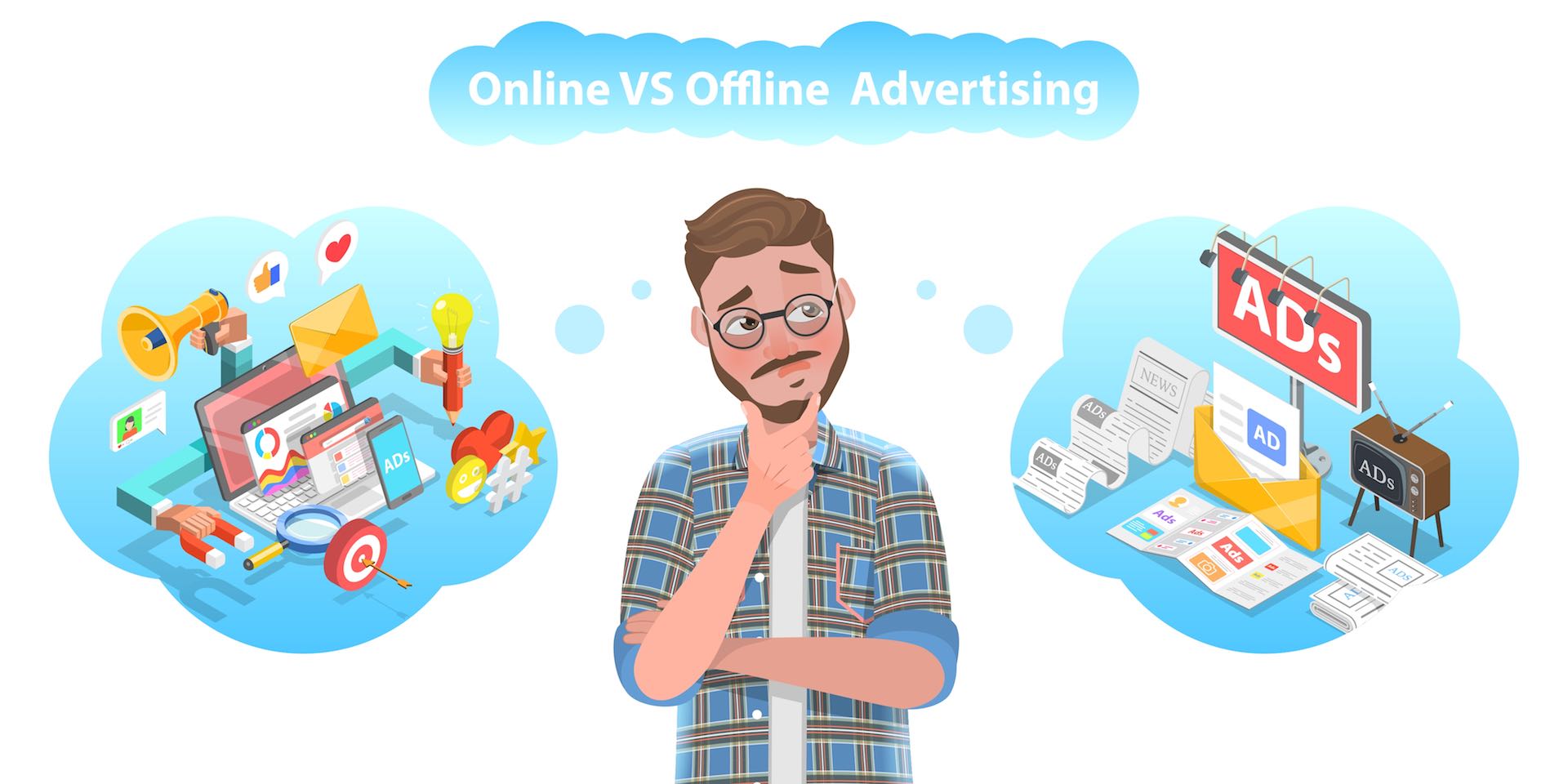How Enterprise SEO Can Maximize Traditional Marketing ROI
Today’s marketing strategies center on digital content, and because audiences across demographics rely so heavily on online engagement, that focus has merit.
However, enterprise brands and organizations that really want to stand apart from the rest must also recognize the important role that traditional marketing still plays.
With that in mind, one of the most important questions an enterprise company can ask is, “where do digital and traditional marketing meet, and how can one boost the other?”
We Live in a Multi-Device, Multi-Screen World
The answer lies in how consumers interact with traditional media such as television commercials or radio ads.
Today, 71% of people who are watching TV use a second screen, such as a phone or tablet, to look up information about what they are watching on TV.
That connection shows a real relationship between the consumer, traditional media, and online marketing potential, especially as it relates to search engine optimization (SEO).
Traditional marketing efforts are often one-sided – typically audience members can’t interact directly with a billboard or a television show.
Advertisement
Continue Reading Below
They can, however, use the information they’ve gained from that interaction and use it to drive a search online.
When traditional marketing and SEO strategies are intertwined, the customer’s journey becomes a robust experience that carries your brand from one part of the funnel to the next.
Enterprise organizations can leverage this journey to bolster traditional and digital marketing efforts, improve brand recognition, connect and strengthen the consumer experience, and ultimately drive ROI.

Why Does Traditional Marketing Still Matter for Enterprise?
Digital platforms and our dependence on them have moved traditional marketing – radio, TV, billboard, and print – out of the spotlight, but that does not mean those channels lack potential.
Advertisement
Continue Reading Below
Instead, traditional marketing channels can add significant value on their own or combined with other marketing initiatives.
Here are a few reasons why:
Content Commands Attention
Few engagement opportunities cultivate undivided attention. Though traditional channels may not consistently win in the battle for focus, they do create an environment where the audience is less likely to become just another bounce metric.
Today, 41% of adults regularly read one or two magazines, and 120.6 million homes have TVs.
These formats, along with billboards and radio, command attention. You can change the channel, but that isn’t as simple as scrolling past a paid search result on social media or in Google search results.
Further, today’s marketing experts work to create ad spots that seamlessly bleed right into radio, TV, or print content.
A pasta brand ad in a cooking or home magazine, for instance, may take on the appearance of engaging content rather than an intrusive ad.
Similarly, a radio ad script may seem like an organic review from a trusted host.
Either way, today’s traditional media efforts can often maintain audience focus while giving the brand uninterrupted attention.
Traditional Marketing Leads to Familiarization
Brand awareness plays a significant role in the success of any marketing effort, and traditional marketing provides enterprise organizations the opportunity to make direct and indirect impressions on an audience.
Brand familiarity can take place at different speeds.
In some cases, a truly memorable commercial will lead to instant brand awareness that may even carry out into social streams or video-sharing platforms.
In other cases, ongoing exposure to a particular ad spot or series of ad spots can also lead to brand awareness, even if the audience member isn’t fully engaged.
Familiarity can and frequently does impact our buying decisions, whether it’s early in the funnel or at the very moment we’re deciding which product to purchase or service provider to choose.
Staying Power
Many of us spend a significant amount of time wrapped up in digital communications. But that doesn’t mean we don’t occasionally put the phone down and turn to less pervasive means of entertainment.
Advertisement
Continue Reading Below
Though statistics can change based on demographics, many of us still spend time watching TV, listening to radio shows or podcasts, and flipping through a newspaper or magazine.
And though dependence on those traditional channels may ebb and flow, it is unlikely those channels will become obsolete any time soon.

Traditional SEO Is Only One Part of a Comprehensive Enterprise SEO Strategy
The term “enterprise” can carry several meanings or connotations, particularly when discussed within a marketing and SEO strategy.
Advertisement
Continue Reading Below
For our purposes, enterprise often refers to the size or scale of a website or business.
Enterprise websites may have complex site structures with hundreds and hundreds (if not thousands) of pages.
An enterprise website may also refer to a website that may be rather small but still manages millions of visits each day.
Finally, the term “enterprise” may also be used to refer to large businesses or organizations.
As you may imagine, each of those enterprise scenarios creates a unique set of marketing needs.
A basic SEO approach may be enough to help a small business grow, but those same strategies may not be as beneficial for enterprise websites and organizations that have more complex needs.
Enterprise SEO goes beyond common strategies to create a holistic approach that includes and influences cross-departmental decisions encompassing sales, branding, digital marketing, print marketing, web development, and user experience.
Few one-size-fits-all business strategies consistently breed success, and that’s true of your SEO and marketing efforts.
Advertisement
Continue Reading Below
Larger companies or businesses that maintain high-traffic websites face unique challenges that simply cannot be addressed using a basic, single-vision approach to SEO.
Enterprise SEO experts recognize these challenges and can help companies deal with issues and concerns or, in some cases, avoid them altogether.
This is particularly true as it relates to the following concerns:
- Legacy issues: Complex legacy tech stacks, inconsistent platform alterations, CMS changes, URL restructuring, and poorly maintained content can decrease the effectiveness of new and existing SEO initiatives.
- Poor content quality: Gone are the days when any keyword-driven content would suffice. Outdated, thin, or duplicate content can cause ongoing site reputation damage in the eyes of site visitors as well as search engines.
- Crawlability and indexability: Search engines determine credibility and quality in several ways, including crawling and indexing. When a website has thousands of pages that aren’t optimized and aligned with marketing goals, new, valuable content can get lost, ranking can slip, and it can even increase business server costs.
- Conflicting corporate environments: Every enterprise company wants to make money, but not all departments and decision-makers agree on how to get there. Any marketing expert will tell you that SEO is frequently the backbone to success, but metrics aren’t always cut and dry. Without the support of Enterprise SEO, it can be challenging to create bring together various organizational arms to create a unified approach.
- Scalability: Smaller companies enjoy the freedom to make page-by-page updates, carry out testing, or tweak their SEO strategy as they see fit. That isn’t always the same for larger companies. Creating a scalable enterprise SEO strategy can make it easier to accommodate changing demands without causing irreparable damage.
Why Enterprise SEO Must Play a Leading Role in Traditional Marketing
Marketing can occasionally breed uncertainty, but two things are consistently true:
- Traditional marketing channels are not going away.
- SEO remains a driving force across multiple marketing channels.
Advertisement
Continue Reading Below
If you want to maximize your traditional marketing ROI, you need to bolster it with a strong enterprise SEO presence. Doing so can help consumers move through the funnel without unnecessary interruptions.
When you combine traditional marketing with enterprise SEO, you can expect the following.
Consumers Can Easily Integrate Their Real-World Experience With Their Digital Searches
Enterprise SEO helps unite the initiatives of each marketing channel.
For traditional marketing efforts, this leads to an environment where a consumer can listen to an ad, read a flyer, or take note of a billboard and easily use a search engine to connect the “real-life” experience with the digital presence.
It Reinforces Brand Recall and Customer Trust
Consumers are savvy researchers, and though some may purchase a brand they never heard of before, many rely on their past interactions – direct and indirect – with a brand.
In fact, the old “Marketing Rule of 7” suggests that consumers typically need at least seven interactions with a brand before they consider it for purchase.
Advertisement
Continue Reading Below
Traditional marketing efforts can be a great starting place for brand interaction, but they can be one-sided.
Combining ad, print, and radio advertising efforts with enterprise SEO makes it more likely that a consumer will continue to interact with your brand.
And, once they move from traditional to digital, it becomes easier to gain their attention through email lists, social media relationships, text messages, etc.
Enterprise SEO Inform and Improve Traditional Campaigns
It may seem that the relationship between traditional marketing and enterprise SEO focuses on moving consumers from the “real” world to the online space, and that’s true.
However, because enterprise SEO offers a holistic approach to marketing as a whole, the relationship can also help your marketing team enhance their understanding of buyer personas.
Ultimately, they can make more informed and impactful decisions about traditional marketing strategies.
 How to Dominate Enterprise SEO to Support Your Traditional Marketing Campaigns
How to Dominate Enterprise SEO to Support Your Traditional Marketing Campaigns
Using enterprise SEO to support your traditional campaigns requires a little forethought.
Advertisement
Continue Reading Below
Here are eight tips on how to use enterprise SEO to support your traditional marketing strategy.
1. Align Your Goals
Marketing is a connected web of channels, and the best way to support any single channel is to ensure that your goals align.
That doesn’t mean that each channel should adhere to the same strategy or even attract the same audience. It does however suggest that your traditional marketing campaign should be built with SEO considerations in mind.
Take time to think about your audience, your goals, and how to leverage enterprise SEO to really maximize traditional marketing ROI.
2. Consider the Consumer Journey
Not every marketing effort should be designed for immediate conversion.
Buyers enter the funnel at different points. Some are gathering information or may not even be aware of a particular need. In that case, your efforts should be targeted at brand awareness.
Others are ready to make a purchase.
Create SEO and traditional strategies that can work together to help consumers make their way from the first impression to conversion.
Advertisement
Continue Reading Below
3. Create Content That Establishes a Seamless Connection With Radio and TV Viewers
As mentioned above, marketers are becoming skilled at creating ads that fit organically with print, TV, and radio content.
This creates the unique opportunity to cultivate organic relationships with an audience.
Work with print, radio, and television personalities and outlets to share specific content with their audience or link your brand’s website in promotional posts.
4. Create a Destination
It isn’t enough to send consumers from traditional spaces to your website.
Instead, the transition to digital should be paved with purpose.
Create landing pages that offer value based on where the consumer came from (e.g., specific radio/podcast, magazine, flyer, etc.), as well as their assumed buyer persona.
5. Don’t Forget Your Other Channels
Enterprise SEO should bring together all your channels under a unified strategy.
Though many users will head directly to their nearest Google search bar, some will may end up searching for your brand on Facebook, Instagram, or other popular social platforms.
Advertisement
Continue Reading Below
Consider how each of these channels can work together to support the other.

6. Offer Mobile-Friendly Landing Pages
Seventy-seven percent of people across all age groups keep a second screen open while watching TV. For adults under 55, that figure stands at over 83%.
Assume that people are Googling your brand and products from a smartphone. Include links to mobile-friendly landing pages in your traditional ads and search results.
Advertisement
Continue Reading Below
7. Consider What Keywords Viewers Might Search
Think carefully about your traditional ad copy and scripts. When someone sees or hears them, what might they type into the search bar, and what do the search results look like?
Aim for a holistic search presence around these branded keywords or product keywords with things like:
- Third-party blog reviews.
- Guest blogs on other websites.
- Google reviews or other user-generated review sites.
8. Optimize Your Google Business Listing
Your Google My Business listing functions as a virtual business card. It gives your brand authority and enforces trust.
Make sure you have a valid address and an optimized description. Focus on generating Google reviews, and claim your search panel so Google knows to embed it in the search results.
There’s more to Google My Business than basic setup and maintenance, however.
Use Geofencing and IP Targeting to Reach Billboard Viewers
Advertisement
Continue Reading Below
Billboard ads are more affordable than they’ve ever been – and thanks to digital marketing, you can maximize your ROI from them as well.
IP targeting and geofencing allow you to run banner ads and social media ads across the digital screens of anyone who came within a certain distance of your billboard.
Consider their state of mind by expanding the conversation you started with the billboard.
Pin Social Media Posts That Relate to Traditional Ads
Social media sites like Facebook and Twitter are high-authority domains, so they tend to show up at the top of search results for branded keywords. Use this to your advantage for traditional campaigns.
Assume customers will click your social profile links and optimize your page for their inevitable visit.
Pin content to the top of your profile that relates to any traditional campaigns you’re currently running.

Use Enterprise SEO and Traditional Marketing to Dominate in Your Niche
Enterprise SEO and traditional marketing may not seem like they have a lot of overlap, but that’s far from accurate.
Advertisement
Continue Reading Below
Consumers who are influenced by traditional marketing strategies are likely to engage with your brand online, whether it’s through a search, a direct site visit, or through social media platforms.
Combining the two can help you cast a wider — yet more targeted — net that can increase site traffic, brand awareness, and ultimately conversions.
The benefits will expand beyond traditional marketing wins, however.
This unified approach that enterprise SEO embodies can help strengthen not only your marketing efforts but your organization as a whole.
More Resources:








